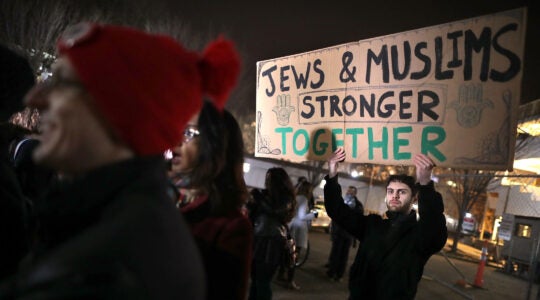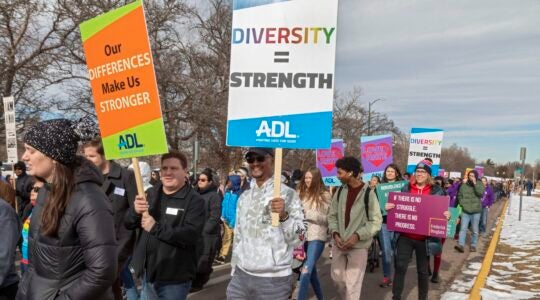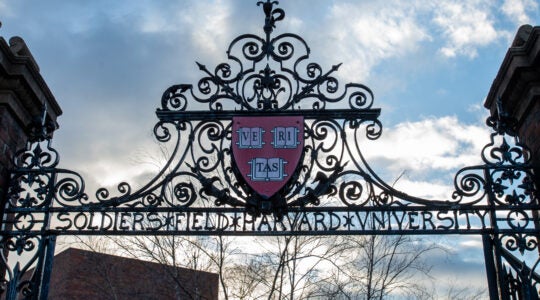NEW YORK (JTA) – In announcing that gay and lesbian students would be allowed to apply for rabbinical training at the Jewish Theological Seminary, Chancellor-elect Arnold Eisen sounded the movement’s popular refrain about halachic pluralism – the notion that competing interpretations of Jewish law can coexist under one roof.Eisen was seeking to mollify those who have resisted liberalizing the Conservative movement’s traditional position barring gay clergy.Throughout the often divisive debate over homosexuality, some have warned that ordaining gay clergy and allowing for same-sex commitment ceremonies would shatter the movement’s commitment to Jewish law and potentially lead to a split with international affiliates.Movement leaders in Israel and Canada greeted Eisen’s announcement cautiously this week. But in a development Eisen may not have anticipated, talk of a schism was most prevalent among supporters of gay admission who don’t think they should have to tolerate halachic positions they consider at odds with Judaism’s ethical foundation.”Where one person’s pluralism ends up excluding another person, I don’t
think that’s acceptable,” said Rabbi Jill Jacobs, a 2003 seminary
graduate. “I think that being an ethical halachic movement is a much
more compelling reason to be part of the movement than pluralism is.”Eisen’s March 26 decision came after months of consultation, including the
commissioning of a movement-wide survey that found support for the move
among a majority of Conservative rabbis, cantors, lay leaders and
seminarians. “The decision to ordain gay and lesbian clergy at JTS is in keeping with the longstanding commitment of the Jewish tradition to pluralism,” Eisen said in a statement. “Pluralism means that we recognize more than one way to be a good Conservative Jew, more than one way of walking authentically in the path of our tradition and of carrying that tradition forward.”It means, too, that we respect those who disagree with us and understand that in the context of all that unites us, diversity makes us stronger.”Pluralism is sometimes said to be the defining feature of Conservative Judaism. It was invoked repeatedly by members of the Committee on Jewish Law and Standards, the movement’s legal authority, which endorsed three conflicting opinions, or teshuvot, on homosexuality in December. Two of those opinions reaffirmed the movement’s traditional opposition to ordaining gay rabbis. But a third opinion, endorsed by a majority of the committee’s 25 members, reversed that position and paved the way for a change in admissions policy at JTS and at the Ziegler School of Rabbinic Studies, the movement’s Los Angeles seminary, which already has admitted two gay students.Rabbi Joel Roth, who authored one of the two conservative opinions and resigned from the law committee following its endorsement of the liberal opinion, told JTA he was “hopeful” the movement was large enough to accommodate both sides. “Right now everybody is on their best behavior and they’re saying exactly the right things,” Roth said. “The question is not what they’re saying now, but what they’ll say a year from now.”Three other members of the law committee also resigned in protest over the liberal opinion, suggesting that the strongest challenge to the pluralism principle would come from those opposed to the change. But in interviews with JTA this week, it was the most vocal supporters of the move to allow gay rabbis who challenged the commitment to pluralism, arguing that the concept is overrated and even detrimental to the health of the movement.In contrast, the movement’s Israel branch – which appears unlikely to follow JTS and the Ziegler School in admitting gay students – issued a cautious endorsement of Eisen’s statement on pluralism. “We look forward at the Schechter Institute to working closely with Professor Eisen in developing the common future for the Conservative/Masorti movement around the world,” said Rabbi Hanan Alexander, a member of the executive committee of the movement’s Israeli rabbinical college.”I agree with Arnie Eisen and with other leaders of the movement who have said that pluralism of a kind is what should characterize the Conservative movement,” he added. “It is because of pluralism that we were able to engage in this debate. I think that kind of deliberative discussion, in which views are aired openly, broadly, I think that’s what makes the Conservative movement great.”The debate over homosexuality has focused attention on other issues in which Conservative synagogues have agreed to disagree, such as women rabbis and egalitarian worship. But in what may be a sign that they see the cultural winds shifting in their favor, some movement liberals lumped non-egalitarian congregations and resistance to gay rabbis together as positions the movement should no longer tolerate. Rabbi Ayelet Cohen, a JTS graduate and associate rabbi at Congregation Beth Simchat Torah, a synagogue for gays and lesbians in New York, said that welcoming people of all sexual orientations should be “a value and not an option.””I think that we’re dealing with a very long tradition of Jewish text and scholarship, and in the scope of Jewish history the movement toward equality and celebrating Jews of all sexual orientations and gender identities is fairly new,” Cohen said. “There’s a lot we need to do to start teaching that as a value, just as there’s a lot the Conservative movement needs to do to teach egalitarianism as a value.”Not everyone who supports gay rabbis agrees with Cohen, however.Amy Eilberg, who in 1985 became the first woman ordained as a Conservative rabbi, said she sympathizes with those who would exclude congregations that cling to traditional positions, but said her experience in interfaith and Middle East peace efforts have convinced her that it’s necessary to maintain relationships across ideological differences. “Part of me is astonished that anyone in the Conservative movement can question the full equality of women, even claiming halachic concerns to bolster that view,” Eilberg said. “And another part of me knows that in the human community people disagree fiercely about very central and primal issues. I’ve learned not to take it personally.”
JTA has documented Jewish history in real-time for over a century. Keep our journalism strong by joining us in supporting independent, award-winning reporting.





